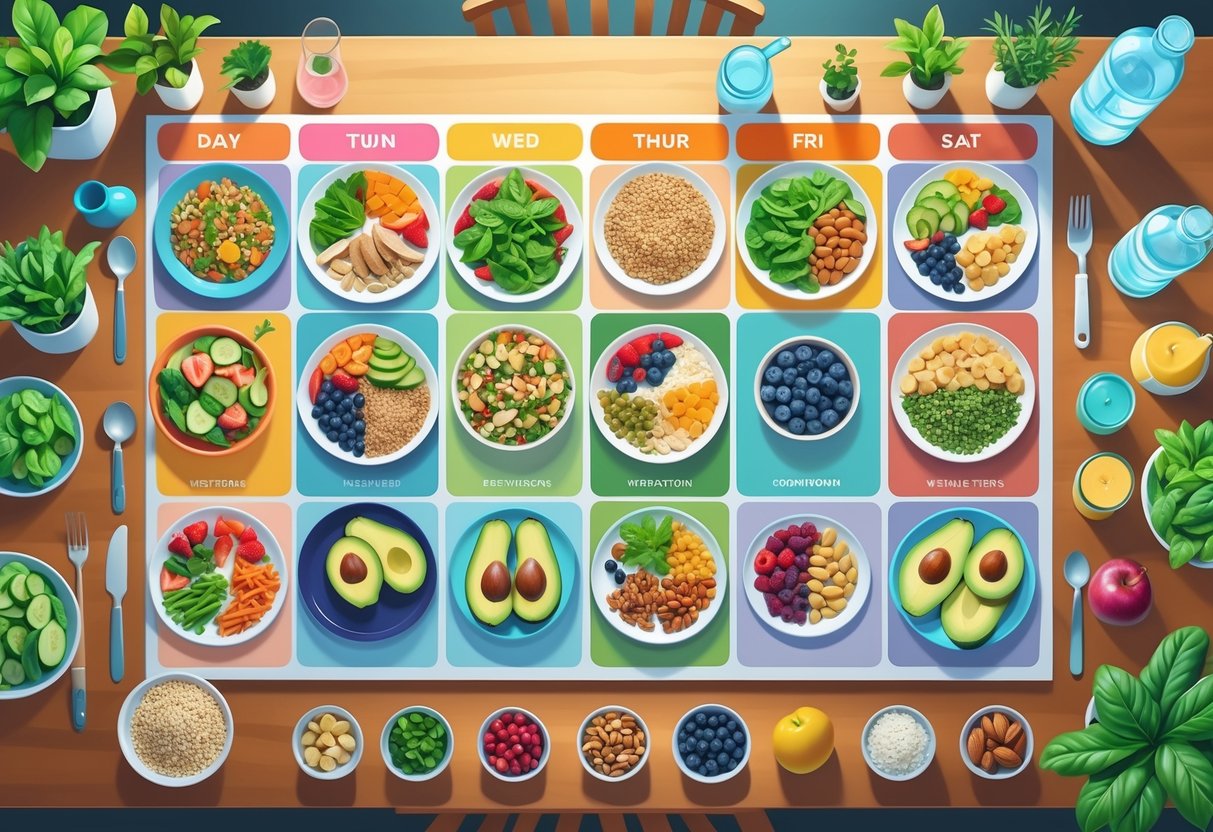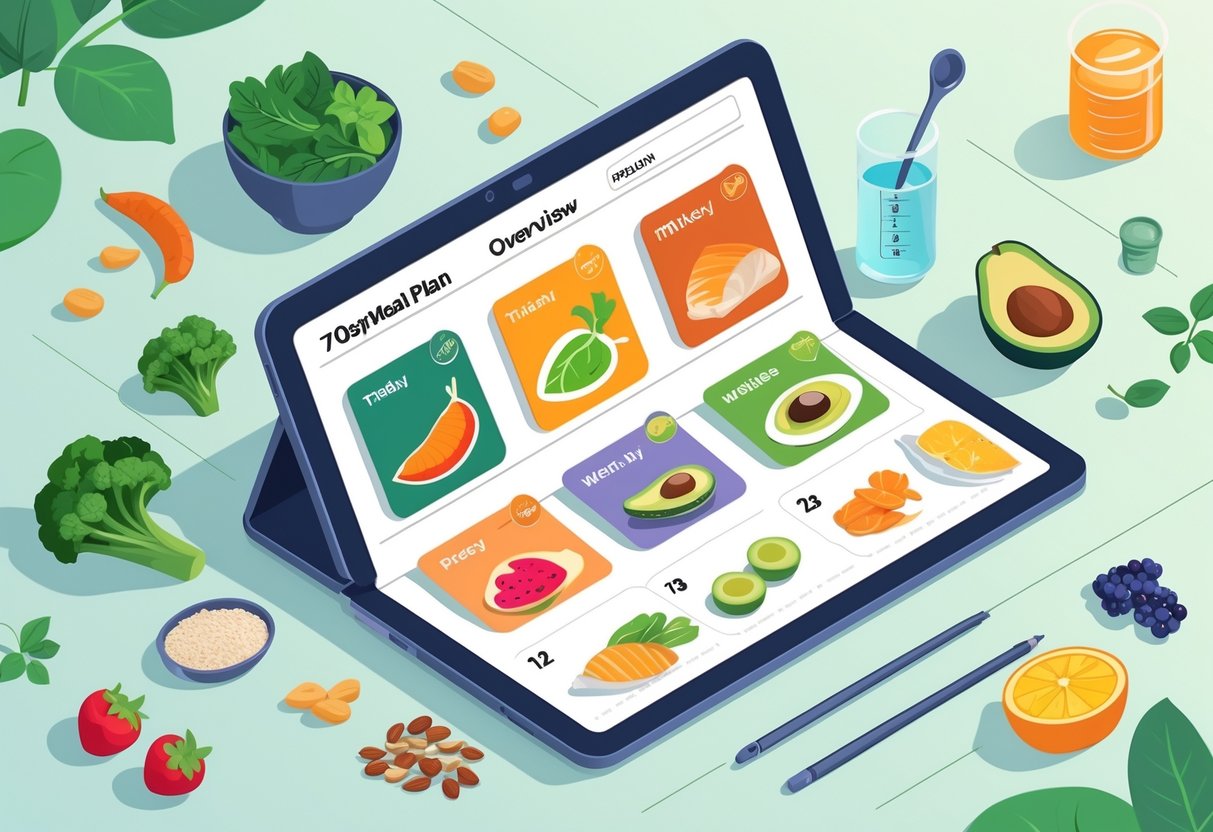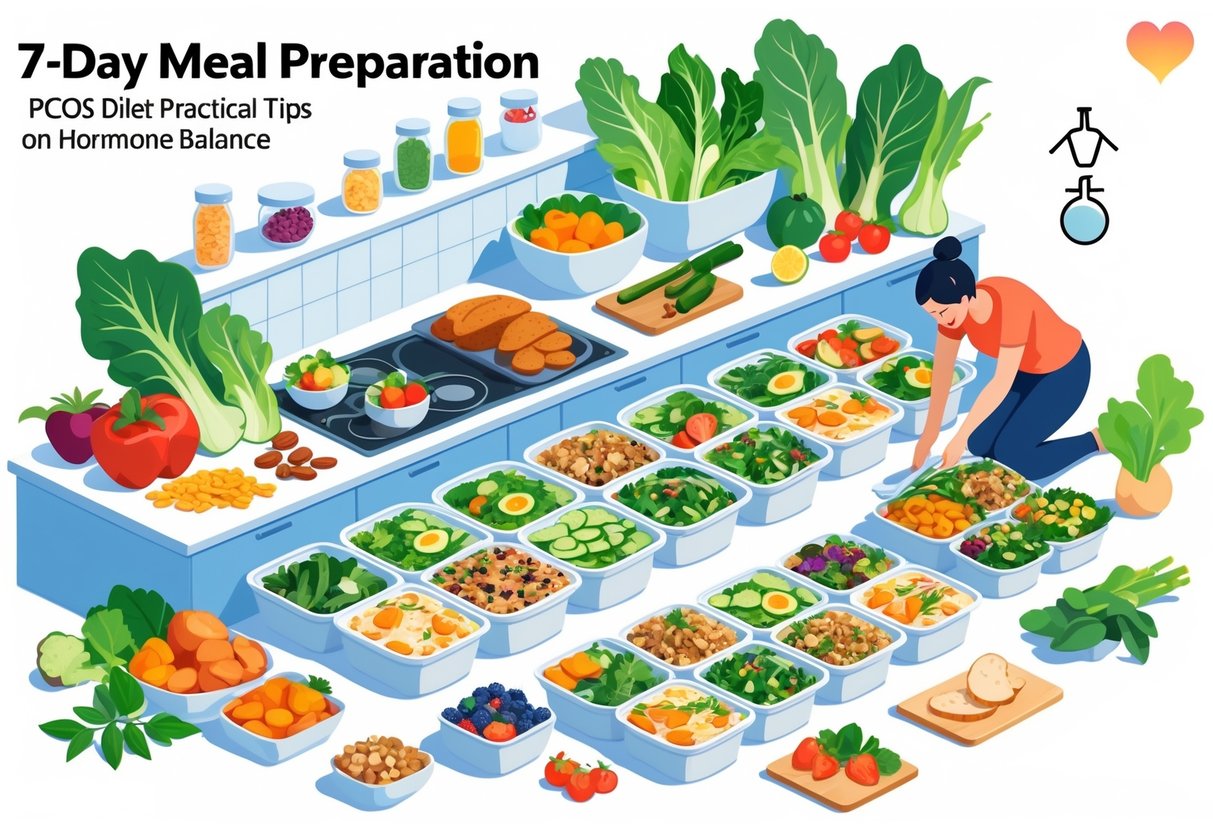Living with PCOS can feel overwhelming, especially when it comes to figuring out what to eat. Many women with polycystic ovary syndrome struggle with weight management, irregular periods, and other hormone-related symptoms that seem impossible to control. The good news is that the right nutrition approach can make a real difference in managing these challenges.

A well-designed PCOS diet plan focuses on balancing blood sugar levels and reducing inflammation, which are key factors in improving hormone balance and reducing symptoms. Research shows that women with PCOS who follow balanced, anti-inflammatory diets[1] often experience better weight management, more regular cycles, and improved energy levels. The key is choosing nutrient-dense whole foods while limiting processed options that can worsen insulin resistance.
This 7-day meal guide takes the guesswork out of meal planning for PCOS. It includes practical recipes and food combinations that support hormone health without requiring restrictive dieting or complex meal prep. Each day is designed to provide steady energy while helping to manage the underlying factors that drive PCOS symptoms.
Key Takeaways
- A PCOS diet plan should focus on whole foods, lean proteins, and high-fiber options to support blood sugar control and hormone balance
- Women with PCOS benefit most from consistent meal timing and balanced portions rather than restrictive dieting approaches
- Combining proper nutrition with lifestyle factors like regular exercise and stress management provides the best results for managing PCOS symptoms
Understanding PCOS and How Diet Impacts Hormones

PCOS affects how the body processes insulin and produces hormones, leading to symptoms like irregular cycles, acne, and fertility challenges. The right dietary approach can help regulate insulin levels, reduce inflammation, and support overall hormone balance.
What Is Polycystic Ovary Syndrome (PCOS)?
PCOS is a hormonal condition that affects roughly one in ten women of reproductive age[2]. It disrupts normal ovarian function and creates imbalances in several key hormones.
Healthcare providers diagnose PCOS when a woman has at least two of these three criteria:
- Irregular or absent periods – cycles longer than 35 days or fewer than 8 periods per year
- Elevated androgen levels – higher testosterone and other male hormones
- Polycystic ovaries – multiple small cysts visible on ultrasound
The condition varies significantly between individuals. Some women experience severe symptoms across multiple areas, while others may only notice mild issues with their menstrual cycle or skin.
PCOS involves complex interactions between genetics, hormone production, and metabolic function. This complexity explains why symptoms can differ so much and why treatment approaches need to be individualized.
The Role of Insulin Resistance in PCOS
Insulin resistance plays a central role in PCOS development and symptom severity. When cells become less responsive to insulin, the body produces more of this hormone to maintain normal blood sugar levels.
How insulin resistance affects PCOS:
- Higher insulin levels stimulate the ovaries to produce excess androgens
- Elevated androgens disrupt normal ovulation and menstrual cycles
- Increased insulin promotes fat storage, particularly around the midsection
- The cycle continues as weight gain can worsen insulin resistance
Research shows that 65-70% of women with PCOS have some degree of insulin resistance. This metabolic dysfunction contributes to many common PCOS symptoms including weight gain, irregular periods, and fertility challenges.
The good news is that insulin resistance is very treatable with proper diet[2]. Dietary changes can improve insulin sensitivity within weeks, leading to better hormone balance and reduced symptoms.
Nutrition and Its Effect on Hormonal Balance
Diet directly influences hormone production, insulin sensitivity, and inflammation levels in women with PCOS. Strategic nutritional choices can help restore balance to disrupted hormonal pathways.
Key dietary factors for hormone regulation:
| Nutrient Focus | Hormonal Impact |
|---|---|
| Protein & Fiber | Stabilizes blood sugar and insulin |
| Omega-3 fats | Reduces inflammation and cortisol levels |
| Complex carbs | Prevents insulin spikes |
| Antioxidants | Supports hormone production |
Blood sugar balance is crucial for PCOS management[2]. Meals that combine protein, healthy fats, and fiber help prevent the rapid blood sugar spikes that worsen insulin resistance.
Anti-inflammatory foods like fatty fish, leafy greens, and berries help reduce chronic inflammation. This supports better insulin sensitivity and may help lower elevated androgen levels.
Regular meal timing also matters for hormone regulation. Consistent eating patterns help maintain stable cortisol levels and prevent the blood sugar fluctuations that can trigger cravings and energy crashes.
Common PCOS Symptoms and Dietary Solutions
PCOS symptoms stem from hormonal imbalances that nutrition can help address. Understanding the connection between specific symptoms and dietary interventions allows for targeted treatment approaches.
Irregular cycles and fertility issues often improve when insulin levels stabilize. Balanced meals focused on protein, fat, and fiber[2] help regulate hormones needed for ovulation.
Acne and skin problems may respond to anti-inflammatory foods and reduced dairy intake. Some women find that limiting high-glycemic foods helps clear their skin.
Weight management challenges become easier when insulin resistance improves. Adequate protein intake supports muscle maintenance and helps control appetite.
Fatigue and mood swings often decrease when blood sugar stays stable throughout the day. Regular meals prevent the energy crashes that contribute to irritability and brain fog.
Cravings for sugar and carbs typically reduce within 2-3 weeks of following a balanced eating pattern. This happens as insulin sensitivity improves and blood sugar becomes more stable.
Core Principles of a PCOS Diet Plan

A successful PCOS diet focuses on stabilizing blood sugar levels through balanced macronutrients and reducing inflammation with carefully selected foods. These dietary strategies support hormonal balance and improve metabolic health for long-term PCOS management.
Balanced Nutrition for Hormone Regulation
Balanced nutrition forms the foundation of effective PCOS management by addressing the hormonal imbalances that drive symptoms. Women with PCOS typically experience elevated insulin levels, increased androgens, and chronic inflammation.
A PCOS-friendly diet requires consistent meal timing and portion control. Eating every 3-4 hours helps prevent blood sugar spikes and crashes. This approach supports insulin sensitivity and reduces cravings.
Key nutritional balance guidelines:
- 25-30% of calories from protein
- 30-35% from healthy fats
- 35-40% from complex carbohydrates
- Focus on whole, unprocessed foods
The right balance of macronutrients helps regulate insulin production. Lower insulin levels can reduce testosterone production and improve ovulation patterns.
Nutrient timing also matters for hormone regulation. Consuming protein and healthy fats with each meal slows carbohydrate absorption. This prevents rapid blood sugar changes that worsen PCOS symptoms.
Understanding Low-Glycemic and Anti-Inflammatory Foods
Low-glycemic foods release glucose slowly into the bloodstream, preventing insulin spikes that worsen PCOS symptoms. The glycemic index measures how quickly foods raise blood sugar levels.
Low-glycemic food choices include:
- Leafy greens and non-starchy vegetables
- Berries and apples
- Quinoa and steel-cut oats
- Legumes and beans
- Nuts and seeds
Anti-inflammatory foods help reduce chronic inflammation associated with PCOS. This inflammation contributes to insulin resistance and hormonal imbalances.
Top anti-inflammatory foods for PCOS:
- Fatty fish rich in omega-3s
- Colorful berries and cherries
- Turmeric and ginger
- Extra virgin olive oil
- Dark leafy greens
Women following a PCOS diet plan focused on anti-inflammatory foods[3] often see improvements in energy levels and mood. These fiber-rich foods also support healthy digestion and weight management.
Optimizing Macronutrients: Protein, Fiber, and Healthy Fats
Protein intake plays a crucial role in PCOS management by stabilizing blood sugar and supporting healthy weight maintenance. Women with PCOS should aim for 20-30 grams of protein per meal.
High-quality protein sources:
- Lean poultry and fish
- Eggs and Greek yogurt
- Tofu and tempeh
- Legumes and quinoa
Fiber-rich foods slow digestion and improve insulin sensitivity. The recommended daily fiber intake for women is 25-35 grams. Most fiber should come from vegetables, fruits, and whole grains.
Healthy fats support hormone production and reduce inflammation. Omega-3 fatty acids are particularly beneficial for women with PCOS.
Essential healthy fat sources:
- Avocados and olive oil
- Walnuts and chia seeds
- Salmon and sardines
- Flaxseeds and hemp hearts
Some women benefit from a moderate low-carb approach, limiting carbohydrates to 100-150 grams daily. This strategy can improve blood sugar control and support metabolic health without being overly restrictive.
Foods to Include and Avoid for PCOS

The right food choices can help balance hormones, improve insulin sensitivity, and reduce inflammation in women with PCOS. Focus on nutrient-dense whole foods while limiting processed items and refined sugars that can worsen symptoms.
Best Foods for Hormone Balance
Lean Proteins support stable blood sugar and hormone production. Salmon provides omega-3 fatty acids that reduce inflammation. Baked salmon pairs well with vegetables for a complete meal.
Chicken and turkey offer high-quality protein without excess saturated fat. Greek yogurt contains protein and probiotics that support gut health.
Plant-based options like tofu and protein powder work well in smoothies. Protein smoothie recipes with almond milk create satisfying breakfast ideas.
Fiber-Rich Foods help regulate blood sugar and support healthy digestion. Leafy greens like spinach contain folate and iron. Broccoli and green beans provide essential vitamins and minerals.
Sweet potatoes offer complex carbohydrates and beta-carotene. Roasted sweet potatoes make an excellent side dish. Berries contain antioxidants and have a lower glycemic impact than other fruits.
Healthy Fats support hormone production and reduce inflammation. Avocados provide monounsaturated fats and fiber. Use avocado in guacamole or add slices to salads.
Nuts like almonds and walnuts offer protein and healthy fats. Chia seeds and flaxseeds contain omega-3s and fiber. Try chia pudding for a nutritious breakfast option.
Olive oil works well in cooking and salad dressings. An olive oil vinaigrette enhances the flavor of vegetables without adding processed ingredients.
Whole Grains and Legumes provide sustained energy and fiber. Quinoa contains complete protein and works well in quinoa salad recipes. Oats support heart health and blood sugar control.
Legumes like chickpeas can be made into hummus for a protein-rich snack. These foods help maintain steady insulin levels throughout the day.
Foods That May Worsen PCOS Symptoms
Refined Sugars and Processed Foods can spike blood sugar and increase insulin resistance. Candy, cookies, and sugary drinks cause rapid glucose changes that stress the hormonal system.
Ultra-processed foods increase inflammation[4], which can worsen PCOS symptoms. Packaged snacks, frozen meals, and fast food often contain additives and preservatives.
High-Glycemic Carbohydrates cause blood sugar spikes that can worsen insulin resistance. White bread, white rice, and regular pasta digest quickly and raise glucose levels rapidly.
These foods can trigger cravings and make weight management more difficult. Choose whole grain alternatives instead.
Inflammatory Foods may increase systemic inflammation and hormone imbalances. Fried foods and processed meats can worsen inflammation[5] in the body.
Excess caffeine and alcohol can disrupt sleep and stress hormone balance. Limit these items to support overall hormonal health.
Trans Fats and Excess Saturated Fats found in fried foods and processed baked goods can increase inflammation. These fats may also worsen insulin resistance over time.
How to Build Your Grocery List
Protein Section should include salmon, mackerel, and sardines for omega-3 fatty acids. Add chicken breast, turkey, and Greek yogurt for lean protein options.
Include tofu and protein powder for plant-based alternatives. Stock up on eggs for versatile breakfast ideas and quick meals.
Produce Department priorities include leafy greens like spinach for salads and smoothies. Choose broccoli, green beans, and other non-starchy vegetables for fiber and nutrients.
Add avocados for healthy fats and sweet potatoes for complex carbohydrates. Select berries for antioxidants and lower-sugar fruit options.
Pantry Staples should feature quinoa, oats, and other whole grains for sustained energy. Include nuts like almonds and walnuts, plus seeds like chia seeds and pumpkin seeds.
Stock olive oil for cooking and salad dressings. Add legumes and almond butter for protein-rich options.
Meal Prep Items might include ingredients for zucchini noodles as pasta alternatives. Plan for baked cod and other fish options for weekly protein rotation.
Consider almond milk for smoothies and chia pudding preparation. Keep hummus ingredients on hand for healthy snacking options.
7-Day PCOS Meal Plan Overview

A structured 7-day PCOS meal plan[3] includes three balanced meals and two snacks daily, emphasizing protein, fiber, and healthy fats to stabilize blood sugar. The plan features nutrient-dense options like baked salmon, Greek yogurt, and quinoa salad while providing essential grocery items for meal preparation.
Daily Meal Structure for Hormone Support
Each day follows a consistent pattern of three main meals plus two strategic snacks. This structure helps maintain steady blood sugar levels throughout the day.
Breakfast should combine protein and fiber within two hours of waking. Options include scrambled eggs with vegetables, chia pudding made with Greek yogurt, or a protein smoothie with spinach and berries.
Mid-morning snacks pair protein with complex carbohydrates. Greek yogurt with nuts or hummus with vegetable sticks work well.
Lunch features lean protein, non-starchy vegetables, and moderate healthy fats. A quinoa salad with chickpeas and olive oil dressing provides balanced nutrition.
Afternoon snacks prevent energy crashes before dinner. Hard-boiled eggs or avocado with whole grain crackers maintain stable glucose.
Dinner emphasizes protein and vegetables with minimal refined carbohydrates. Baked cod with roasted sweet potatoes or baked salmon with steamed broccoli support evening hormone regulation.
Each meal contains 15-25 grams of protein to support insulin sensitivity.
Sample Meals for Each Day
Day 1: Scrambled eggs with spinach and avocado toast, Greek yogurt with berries, quinoa salad with grilled chicken, almonds and apple, baked salmon with roasted vegetables.
Day 2: Chia pudding with almond milk and walnuts, hummus with carrot sticks, lentil soup with whole grain roll, hard-boiled egg, turkey meatballs with zucchini noodles.
Day 3: Protein smoothie with spinach and banana, cottage cheese with cucumber, tuna salad over mixed greens, trail mix portion, baked cod with roasted sweet potatoes.
Day 4: Oatmeal with ground flaxseed and berries, Greek yogurt with nuts, chicken and vegetable stir-fry over brown rice, avocado with crackers, grilled lean beef with asparagus.
The remaining three days continue this pattern while rotating protein sources and vegetables to ensure nutritional variety and prevent meal monotony.
Grocery List Essentials
Proteins: Eggs, Greek yogurt, salmon fillets, cod, chicken breast, turkey, canned tuna, cottage cheese, almonds, walnuts, chia seeds.
Vegetables: Spinach, kale, broccoli, asparagus, sweet potatoes, carrots, cucumber, bell peppers, zucchini, onions, garlic.
Fruits: Berries, apples, bananas, oranges, avocado.
Grains: Quinoa, brown rice, oats, whole grain bread, whole grain crackers.
Pantry Items: Olive oil, coconut oil, almond milk, hummus, canned beans, herbs and spices.
Meal Prep Tools: Glass containers, measuring cups, food scale for portion control.
This PCOS diet plan PDF[5] approach ensures consistent access to hormone-balancing nutrients while simplifying weekly shopping and preparation routines.
Meal Preparation and Practical Tips

Smart meal preparation transforms a PCOS diet plan from overwhelming to manageable. Batch cooking saves time while ensuring balanced nutrition stays consistent throughout busy weeks.
Batch Cooking and Leftover Strategies
Protein-focused batch cooking works best for PCOS meal plans. Cook large portions of chicken, turkey, or fish on Sundays. Store them in individual containers for quick weekday assembly.
Prepare hormone-balancing ingredients in bulk. Cook quinoa, brown rice, and roasted vegetables ahead of time. These complex carbs help stabilize blood sugar levels.
Smart leftover rotation prevents boredom. Transform roasted chicken into three different meals: salad bowls, grain bowls, and soup. This approach maximizes variety while minimizing prep time.
Freezer-friendly options extend meal prep success. Soups, stews, and casseroles freeze well for up to three months. Label containers with dates and reheating instructions.
Portion control containers help maintain balanced nutrition. Use divided containers to ensure each meal contains proper ratios of protein, complex carbs, healthy fats, and fiber.
Meal Prep Tips for Busy Schedules
Two-hour Sunday sessions can prepare an entire week’s PCOS meal plan. Focus on washing vegetables, cooking grains, and preparing proteins during this dedicated time block.
Prep ingredients, not full meals when time is limited. Wash and chop vegetables, cook grains, and marinate proteins. Assembly becomes quick during busy weekdays.
Strategic kitchen tools speed up meal prep significantly. Food processors, slow cookers, and sheet pans reduce hands-on cooking time while maintaining nutritional quality.
Grab-and-go snack preparation prevents poor food choices. Pre-portion nuts, cut vegetables, and prepare protein-rich options like hard-boiled eggs or Greek yogurt parfaits.
Weekly menu planning streamlines grocery shopping and reduces decision fatigue. Choose recipes that support hormone balance[6] and create detailed shopping lists before store visits.
Lifestyle Factors for Successful PCOS Management

Diet alone cannot fully address PCOS symptoms. Stress management, quality sleep, and regular physical activity work together with nutrition to regulate hormones and improve insulin sensitivity.
How Stress and Sleep Affect Hormones
Chronic stress raises cortisol levels, which worsens insulin resistance and disrupts hormone regulation. High cortisol interferes with ovulation and increases androgen production.
Women with PCOS need 7-9 hours of quality sleep each night. Poor sleep patterns increase cortisol and make insulin resistance worse. This creates a cycle where hormones become harder to balance.
Stress reduction techniques include:
- Deep breathing exercises for 5-10 minutes daily
- Meditation or mindfulness practices
- Regular yoga sessions
- Journaling before bedtime
Sleep hygiene matters for hormone health. Women should keep bedrooms cool and dark. They should avoid screens for one hour before bed. Going to bed and waking up at the same time helps regulate circadian rhythms.
Elevated stress hormones can trigger food cravings for sugar and refined carbs. This makes blood sugar control more difficult.
The Role of Physical Activity
Regular exercise improves insulin sensitivity and reduces androgen levels. Physical activity helps with PCOS management by lowering inflammation and supporting weight maintenance.
Strength training is particularly beneficial for women with PCOS. Building muscle mass improves how the body uses glucose. Aim for 2-3 strength sessions per week.
Cardio exercise should be moderate intensity. Walking, swimming, or cycling for 30 minutes most days helps hormone regulation. High-intensity workouts can sometimes increase cortisol levels.
The best exercise routine combines both strength and cardio training. Consistency matters more than intensity for long-term hormone balance.
Movement after meals helps control blood sugar spikes. Even a 10-minute walk can make a difference.
Long-Term Nutritional Strategies
Sustainable PCOS management requires consistent eating patterns rather than restrictive diets. Evidence-based meal planning[7] focuses on progress over perfection.
Key nutritional principles include:
- Eating protein with every meal and snack
- Including fiber-rich vegetables at lunch and dinner
- Choosing whole grains over refined carbohydrates
- Adding healthy fats to support hormone production
Meal timing affects blood sugar control. Eating every 3-4 hours prevents large glucose spikes. Skipping meals can worsen insulin resistance.
Anti-inflammatory foods support hormone balance long-term. These include fatty fish, leafy greens, berries, and nuts. Limiting processed foods reduces inflammation markers.
Regular meal prep helps maintain consistent nutrition habits. Planning meals in advance prevents impulsive food choices that can disrupt blood sugar control.
Frequently Asked Questions

Women with PCOS often have specific questions about meal planning and dietary approaches. The most common concerns involve food choices, meal timing, weight management strategies, and how different eating patterns affect hormone levels.
What foods should you include in a 7-day meal plan for PCOS hormone balance?
A balanced PCOS meal plan[8] should focus on foods that stabilize blood sugar and reduce inflammation. Lean proteins like chicken, fish, eggs, and tofu help maintain steady insulin levels.
Complex carbohydrates such as quinoa, brown rice, and sweet potatoes provide sustained energy without causing blood sugar spikes. These foods contain fiber that slows glucose absorption.
Healthy fats from avocados, nuts, seeds, and olive oil support hormone production. These fats also help reduce inflammation commonly seen in PCOS.
Non-starchy vegetables like spinach, broccoli, bell peppers, and cucumber provide essential nutrients with minimal carbohydrates. They add volume to meals while supporting overall health.
Anti-inflammatory foods such as fatty fish, berries, and leafy greens help manage PCOS-related inflammation. Green tea also provides antioxidants that may benefit hormone balance.
How does a 30-day meal plan help manage PCOS symptoms?
A 30-day structured eating plan allows women to establish consistent eating patterns that support hormone regulation. This extended timeframe helps stabilize insulin levels and reduce symptom severity.
Longer meal plans provide enough time for the body to adapt to dietary changes. Blood sugar control typically improves within 2-4 weeks of consistent healthy eating.
Extended meal planning helps identify which foods trigger symptoms and which ones provide relief. This knowledge allows women to customize their approach for better results.
A month-long plan creates sustainable habits rather than temporary changes. These lasting behaviors contribute to long-term PCOS management success.
Where can I find a free PCOS meal plan that supports weight loss?
Several registered dietitians offer free 7-day PCOS diet plans[3] with downloadable PDFs. These resources typically include meal ideas and shopping lists.
Many PCOS-focused websites provide comprehensive meal planning guides[5] created by nutrition professionals. These plans often include recipes and preparation tips.
Healthcare providers sometimes offer meal planning resources as part of PCOS treatment programs. Patients should ask their doctors about available materials.
PCOS support groups and online communities often share meal planning resources among members. These peer-reviewed options can provide practical insights from women with similar experiences.
What are the key components of an effective PCOS diet for weight loss?
Protein intake should comprise 25-30% of daily calories to support metabolism and reduce hunger. This macronutrient helps maintain muscle mass during weight loss.
Fiber-rich foods help control appetite and stabilize blood sugar levels. Women with PCOS should aim for 25-35 grams of fiber daily from whole foods.
Portion control plays a crucial role in creating the calorie deficit needed for weight loss. Using smaller plates and measuring portions can help manage intake.
Regular meal timing prevents blood sugar fluctuations that can trigger cravings. Eating every 3-4 hours helps maintain steady energy levels.
Limiting refined carbohydrates and added sugars reduces insulin spikes that promote fat storage. Focus on whole, unprocessed foods instead.
Can you provide examples of PCOS-friendly recipes that promote weight loss?
Grilled salmon with roasted vegetables provides lean protein and healthy fats while keeping carbohydrates low. This combination supports satiety and hormone production.
Greek yogurt with berries and nuts offers protein, probiotics, and antioxidants. The fiber from berries helps slow sugar absorption.
Quinoa salad with chickpeas and vegetables delivers complete protein and complex carbohydrates. The fiber content helps with blood sugar control.
Egg-based dishes like vegetable omelets provide high-quality protein with minimal carbohydrates. Adding spinach and peppers increases nutrient density.
Stir-fried tofu with brown rice and vegetables offers plant-based protein with fiber-rich carbohydrates. This combination supports stable blood sugar levels.
How does the 5 2 diet affect hormonal balance in women with PCOS?
The 5:2 intermittent fasting approach may help improve insulin sensitivity in some women with PCOS. This eating pattern involves normal eating five days and restricted calories two days.
Limited research suggests intermittent fasting might support weight loss and hormone regulation. However, results vary significantly among individuals with PCOS.
Some women experience improved menstrual regularity with intermittent fasting protocols. Others may find their symptoms worsen with this approach.
Fasting periods can be challenging for women with PCOS who experience blood sugar instability. Close monitoring is essential when trying this eating pattern.
Healthcare providers should supervise any intermittent fasting approach for PCOS management. Individual medical history and current symptoms influence safety and effectiveness.
References
- balanced, anti-inflammatory diets. https://thrivingpcos.com/7DayGuide Accessed November 7, 2025
- The Ultimate PCOS Diet Guide: What to Eat, Avoid, and Why. https://fuelnutritionpcos.com/the-ultimate-pcos-diet-guide/ Accessed November 7, 2025
- A Dietitian's 7-Day PCOS Diet Plan (Free PDF Included). https://pcosnutritionistalyssa.com/7-day-pcos-diet-plan/ Accessed November 7, 2025
- 7 Days PCOS Diet Plan: Foods to Eat and Avoid. https://gynoveda.com/blogs/nutrition/7-days-pcos-diet-chart-foods-to-eat-and-avoid/ Accessed November 7, 2025
- 7-Day PCOS Diet Plan ( + Free PDF Download). https://hannahandersonnutrition.com/7-day-pcos-diet-plan-free-pdf-download/ Accessed November 7, 2025
- PCOS Meal Plan [Complete Guide & 7 Day PCOS Meal Plan pdf]. https://pcosnutritionanswers.com/pcos-meal-planning-complete-guide/ Accessed November 7, 2025
- Managing PCOS with Diet: Evidence-Based Meal Planning. https://www.sciencenewstoday.org/managing-pcos-with-diet-evidence-based-meal-planning Accessed November 7, 2025
- 7-Day PCOS Meal Plan: A Comprehensive Guide to Balanced Nutrition. https://thepcosplate.com/7-day-pcos-meal-plan-a-comprehensive-guide-to-balanced-nutrition/ Accessed November 7, 2025
